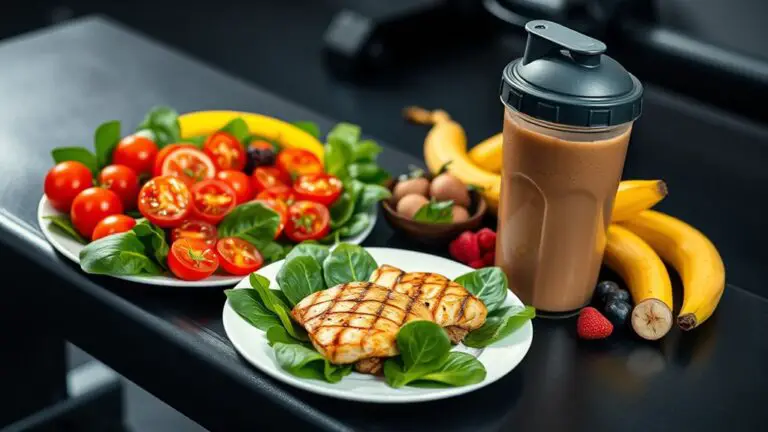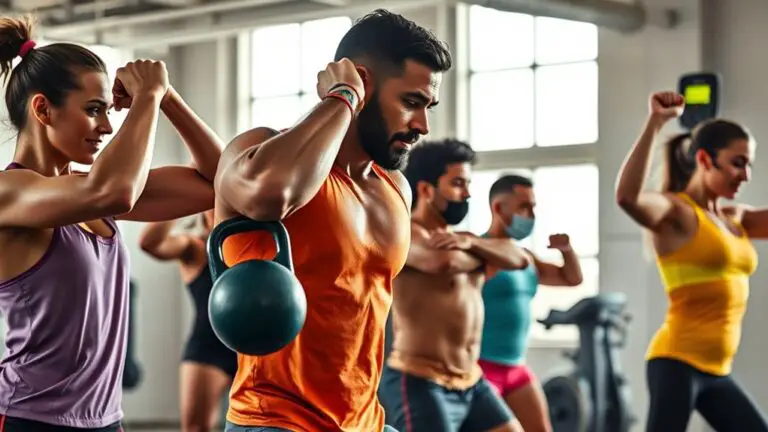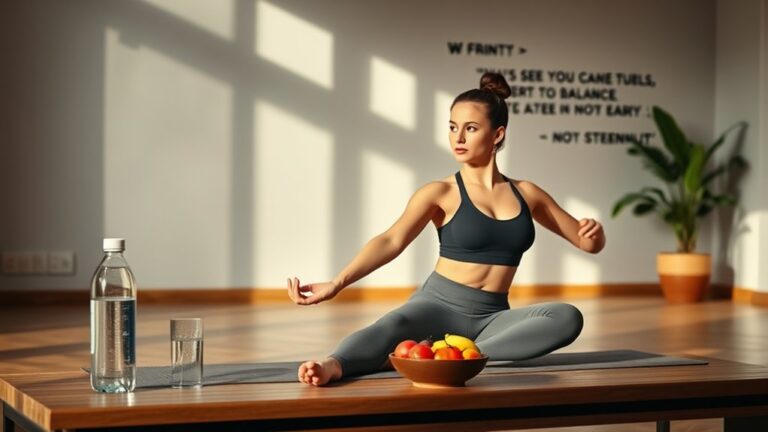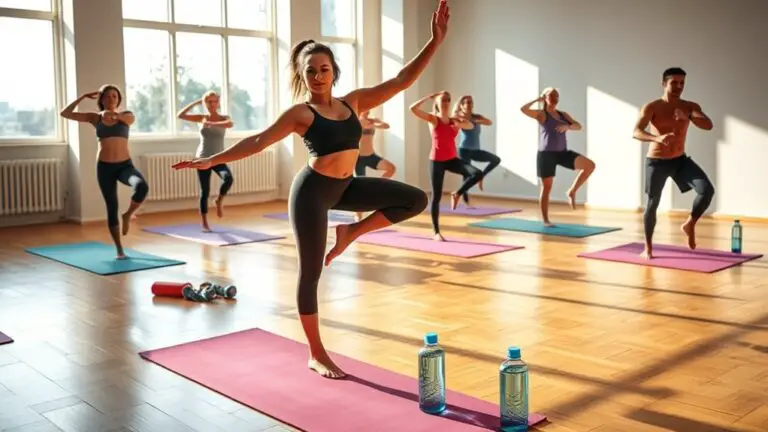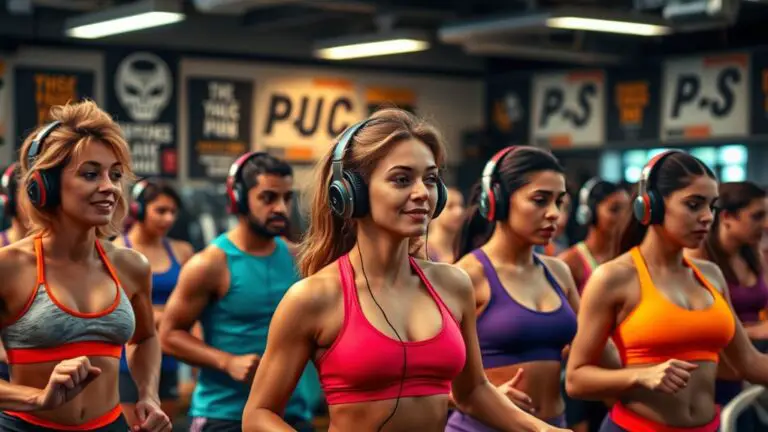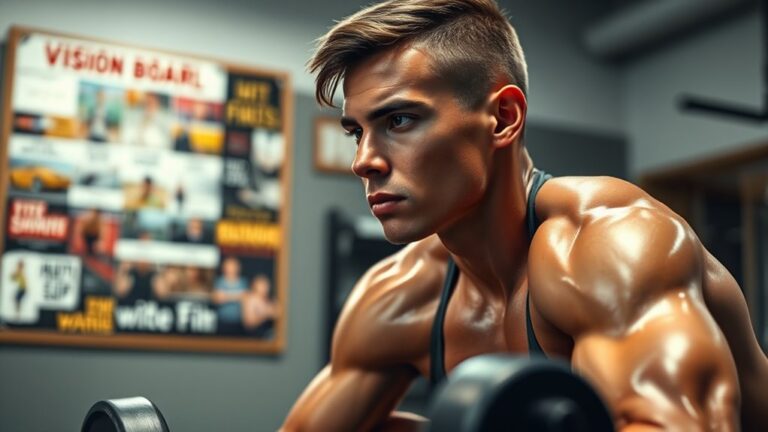How to Stay Hydrated for Optimal Gym Performance
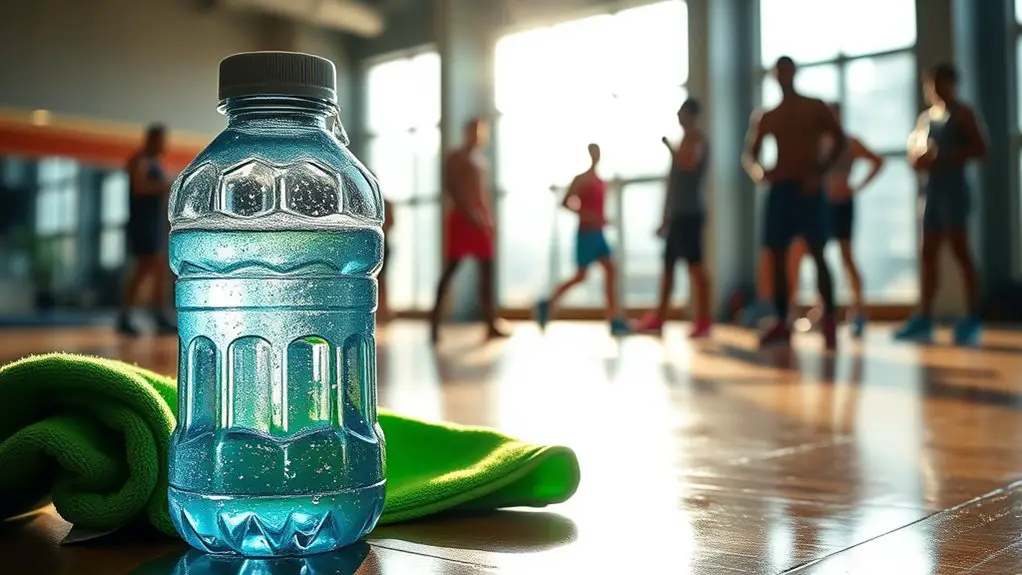
To stay hydrated for peak gym performance, drink 16-20 ounces of water at least two hours before your workout. During intense sessions, sip 7-10 ounces every 10-20 minutes, and rehydrate afterwards with 16-24 ounces for every pound lost. Watch for dehydration signs like dry mouth or fatigue, and consider electrolyte drinks if sweating heavily. Consistently track your intake and set reminders to help you stay on top of your hydration game. You’ll discover more tips to enhance your routine.
Understanding Your Hydration Needs
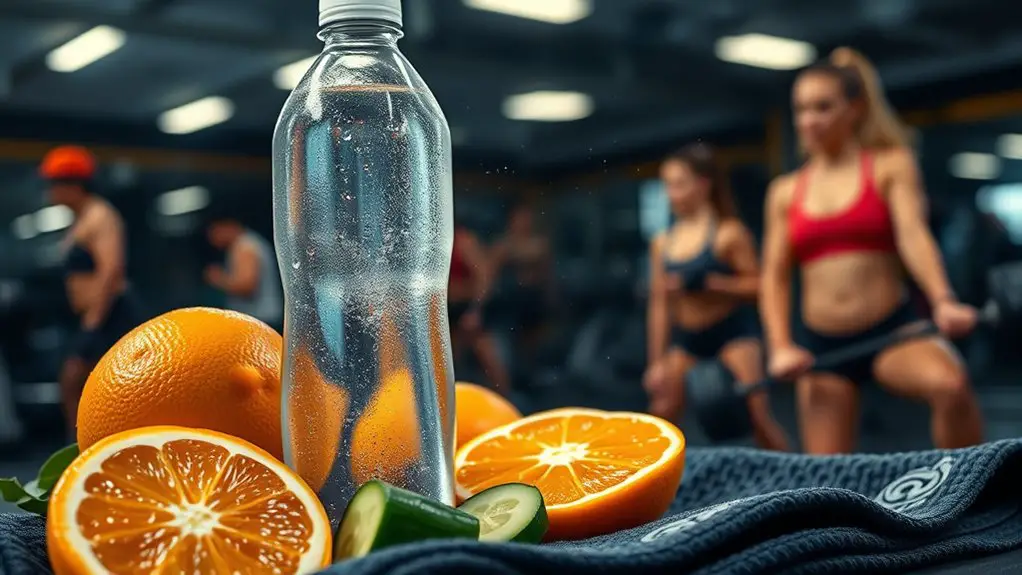
Understanding your hydration needs is essential for maximizing gym performance, especially since even mild dehydration can impair strength, endurance, and overall workout effectiveness. You might’ve heard hydration myths, like the idea that you only need to drink water when you’re thirsty. This isn’t true; you should proactively hydrate throughout the day.
Recent hydration technology, including smart water bottles and hydration apps, can help track your intake and remind you to drink. Aim for about half your body weight in ounces of water daily, adjusting based on your activity level and sweat rate.
Keep in mind that factors like temperature and workout intensity can also influence your hydration needs. Instead of relying solely on thirst, use these tools to guarantee you’re adequately hydrated, allowing your body to perform at its best during workouts. Prioritize hydration to support your fitness goals effectively.
Best Times to Hydrate Before, During, and After Workouts
Timing your hydration can greatly impact your gym performance. Getting your hydration timing right guarantees you’re fueled for your workouts and aids recovery. Here’s a quick guide to help you enhance fluid intake:
- Before workouts: Aim to drink 16-20 ounces of water at least two hours prior to exercising.
- During workouts: Sip on 7-10 ounces of water every 10-20 minutes, especially during intense sessions.
- After workouts: Rehydrate with 16-24 ounces of fluid for every pound lost during exercise.
- Consider electrolytes: If you’re sweating heavily or exercising for over an hour, incorporate electrolyte drinks for peak fluid replenishment.
Signs of Dehydration to Watch For
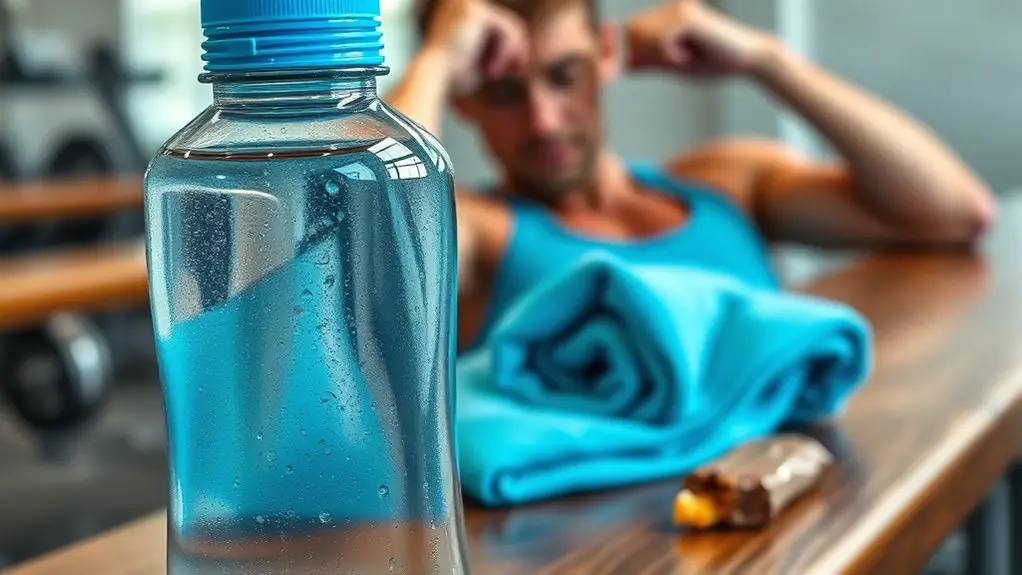
When you’re pushing your limits in the gym, it’s crucial to recognize the signs of dehydration, as even mild fluid loss can hinder your performance. Common dehydration symptoms include dry mouth, fatigue, dizziness, and dark-colored urine. If you notice any of these, it’s a signal to hydrate immediately. You should also pay attention to how you feel during workouts; increased heart rate or muscle cramps can indicate you’re not drinking enough.
To help you stay on top of your hydration, create a hydration checklist. Include reminders to drink water before, during, and after your workouts. Aim to consume at least 16-20 ounces of water two hours before exercising and 8 ounces every 15-20 minutes during your session. By being proactive and recognizing these signs, you’ll guarantee peak performance and overall well-being in the gym. Stay vigilant, and don’t let dehydration derail your fitness goals.
Hydration Strategies for Different Types of Workouts
To maximize your gym performance, it’s essential to tailor your hydration strategy to the type of workout you’re doing. Before, during, and after your sessions, specific hydration practices can help maintain your energy levels and optimize recovery. Let’s break down effective hydration tips for various workout intensities and durations.
Pre-Workout Hydration Tips
How can you guarantee perfect hydration before hitting the gym? Proper pre-workout hydration is essential for maximizing your performance and debunking hydration myths. Here are some effective tips:
- Drink at least 16-20 ounces of water 1-2 hours before exercising.
- Consider using pre workout beverages that contain electrolytes for best balance.
- Avoid caffeinated drinks right before your workout, as they may lead to dehydration.
- Listen to your body; if you’re thirsty, drink more water.
Hydration During Intense Sessions
While you’re pushing your limits during intense workouts, maintaining hydration is crucial for sustaining energy and optimizing performance. You should aim to drink water regularly, but for sessions lasting over an hour, consider electrolyte-rich beverages to support your electrolyte balance. Many hydration myths suggest that plain water is enough; however, during prolonged exertion, you lose essential minerals through sweat.
For high-intensity workouts, try sipping on a sports drink containing sodium and potassium, which can enhance absorption and retention of fluids. Remember, thirst isn’t always a reliable indicator of hydration needs, so proactively hydrate before, during, and after your session. By understanding these strategies, you’ll guarantee you stay energized and perform at your best.
Post-Workout Replenishment Strategies
After an intense workout, replenishing fluids and nutrients is essential for recovery and ideal performance in subsequent sessions. Here are some effective post-workout replenishment strategies:
- Hydrate with water: Aim for at least 16-24 ounces within an hour.
- Incorporate post workout smoothies: Blend fruits, vegetables, and protein to restore energy and nutrients.
- Balance electrolytes: Include sources like coconut water or electrolyte drinks to replenish sodium and potassium lost during exercise.
- Consume protein: Pair carbs with protein to enhance muscle recovery.
Focusing on these strategies helps maintain your electrolyte balance and guarantees that your body effectively recovers. Adapting these techniques based on workout intensity can greatly improve your gym performance over time.
Incorporating Hydrating Foods Into Your Diet
Incorporating hydrating foods into your diet can greatly enhance your overall gym performance. Moisture-rich fruits like watermelon, cucumber, and oranges not only provide hydration but also deliver essential vitamins and minerals. These fruits are high in water content—watermelon, for instance, is about 92% water. Including these in your meals or snacks can help maintain your hydration levels, especially during intense workouts.
Additionally, consider adding hydrating snacks such as yogurt, which contains both water and electrolytes. Pairing yogurt with berries or a smoothie can create a delicious, hydrating option that fuels your body before or after exercise. Leafy greens like spinach and lettuce are also excellent choices; they can be easily incorporated into salads or smoothies. By prioritizing these hydrating foods, you’ll support your hydration needs and enhance your gym performance effectively.
Tips for Staying Consistently Hydrated Throughout the Day
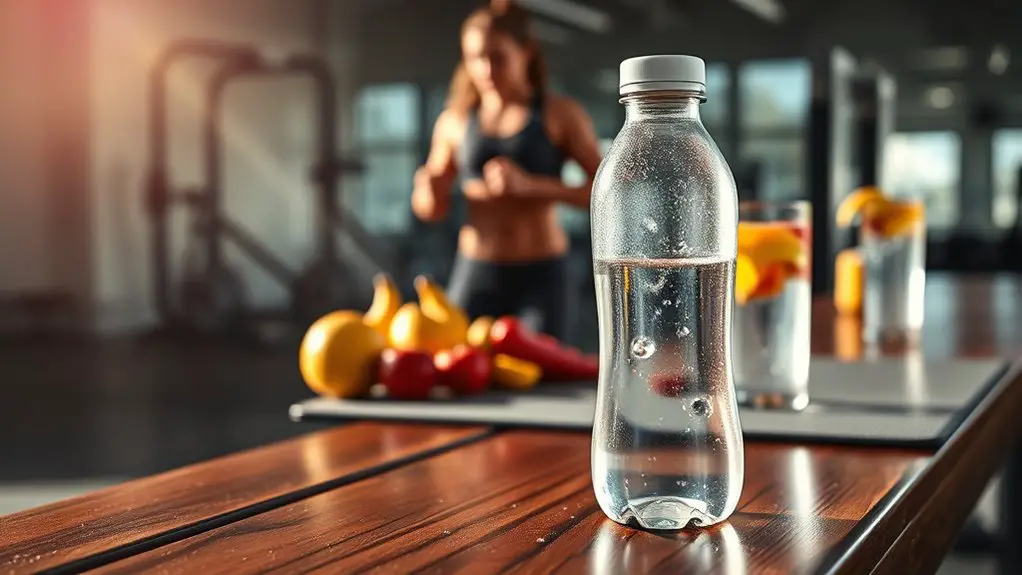
To stay consistently hydrated throughout the day, start by setting realistic daily water goals that fit your lifestyle. Using hydration reminders, whether through apps or simple alarms, can help keep you accountable. These strategies can make a significant difference in your overall hydration and gym performance.
Set Daily Water Goals
Setting daily water goals can greatly enhance your gym performance and overall well-being. By tracking your daily intake and establishing clear targets, you can stay on top of your hydration needs. Consider these tips:
- Use a daily water tracker to monitor your intake.
- Adjust your goals based on your workout intensity and climate.
- Create personalized hydration plans to fit your lifestyle and preferences.
- Set reminders to drink water throughout the day.
Use Hydration Reminders
How can you guarantee you’re drinking enough water throughout the day? One effective strategy is to use hydration reminders. Hydration apps can help you track your intake and send you notifications to drink water at regular intervals. Setting reminder alarms on your phone or smartwatch can also keep hydration top-of-mind. Research shows that consistent reminders improve overall water consumption, making it easier to reach your daily goals. Try scheduling alarms every hour or using app features that allow you to customize your reminders based on your activity levels. By integrating these tools into your routine, you’ll develop a habit of staying hydrated, which can greatly enhance your gym performance and overall well-being.
Frequently Asked Questions
Can I Drink Coffee or Tea for Hydration?
Imagine sipping a warm cup of coffee or tea, feeling the steam rise like a comforting embrace. While both can contribute to your daily hydration, coffee offers benefits like increased alertness, though it’s a mild diuretic. Tea, on the other hand, is rich in antioxidants and can hydrate effectively. So, while they’re not substitutes for water, enjoying them in moderation can still keep you refreshed and energized throughout your day.
How Do Electrolytes Affect My Hydration Levels?
Electrolytes play an essential role in maintaining your electrolyte balance, which directly impacts your hydration levels. They help regulate fluid balance in your cells, ensuring you stay properly hydrated. When you sweat, you lose not just water but also vital electrolytes like sodium and potassium. Incorporating hydration strategies that include electrolyte-rich drinks or foods can enhance your overall hydration, especially during intense workouts. Staying mindful of your electrolyte intake is key to peak performance.
Is It Possible to Overhydrate?
Yes, it’s possible to overhydrate, which can disrupt your hydration balance. When you consume too much water, you might experience overhydration symptoms like headache, nausea, or confusion. This happens because excessive water dilutes electrolytes in your body, leading to a condition called hyponatremia. To avoid this, listen to your body’s thirst cues and monitor your intake, especially during intense workouts. Staying informed helps maintain ideal hydration without risking overhydration.
Should I Avoid Alcohol for Better Hydration?
Think of your body as a garden; without proper watering, it wilts. If you’re aiming for ideal hydration, it’s wise to steer clear of alcohol. Alcohol alternatives can keep your garden thriving. Timing matters too—hydrate before, during, and after physical activity for the best results. Research shows alcohol can dehydrate you, so prioritizing water or electrolyte-rich drinks is a smarter choice. Your body will thank you for it!
How Does Climate Affect My Hydration Needs?
Climate plays a significant role in your hydration needs. In high humidity levels, your body sweats more, which can lead to quicker dehydration. Temperature extremes, whether hot or cold, can also impact fluid loss and your thirst response. When it’s hot, you might need to drink more water to compensate for sweat, while cold weather can mask thirst, making you less aware of your hydration status. Always adjust your intake based on these factors.
